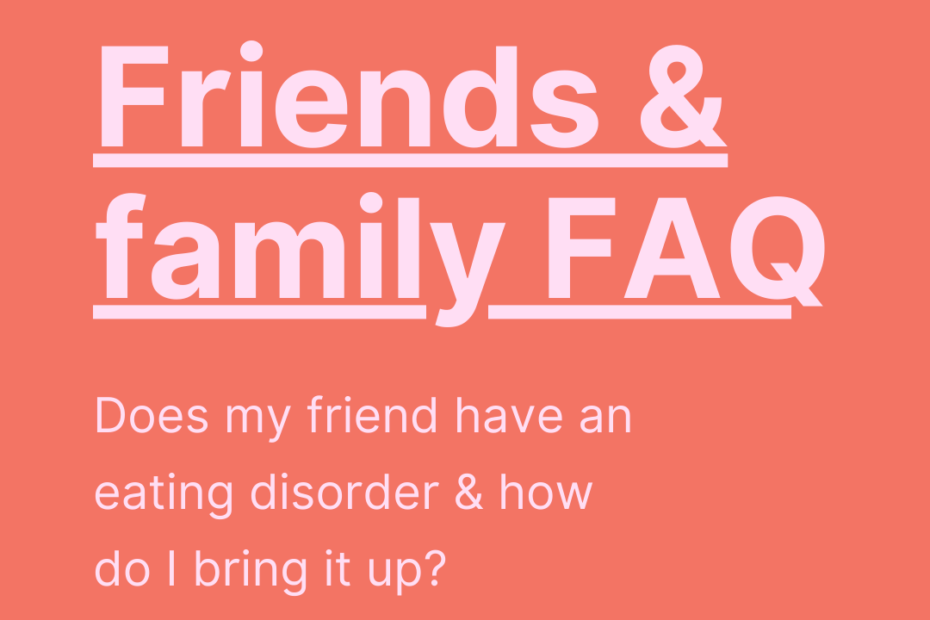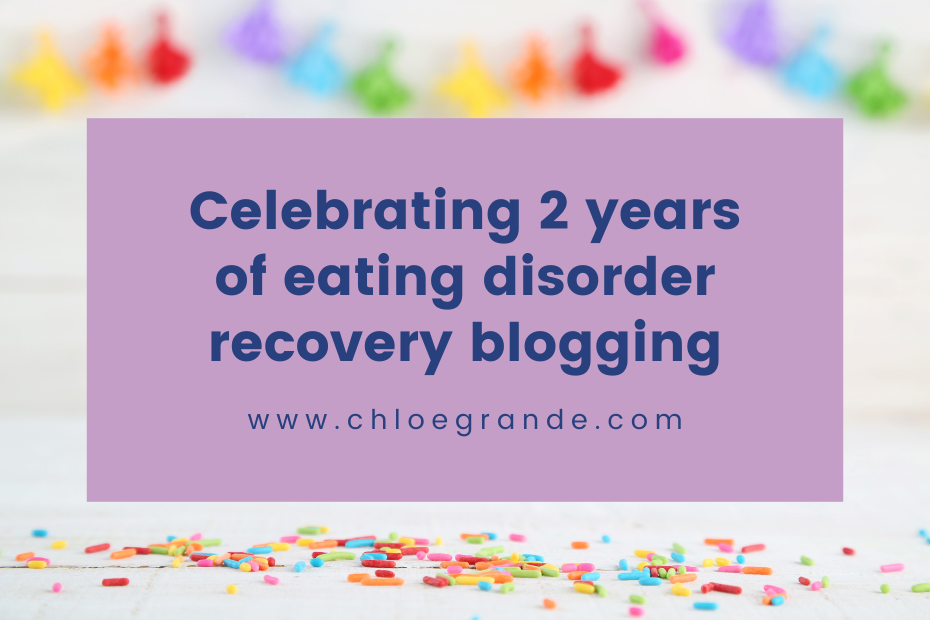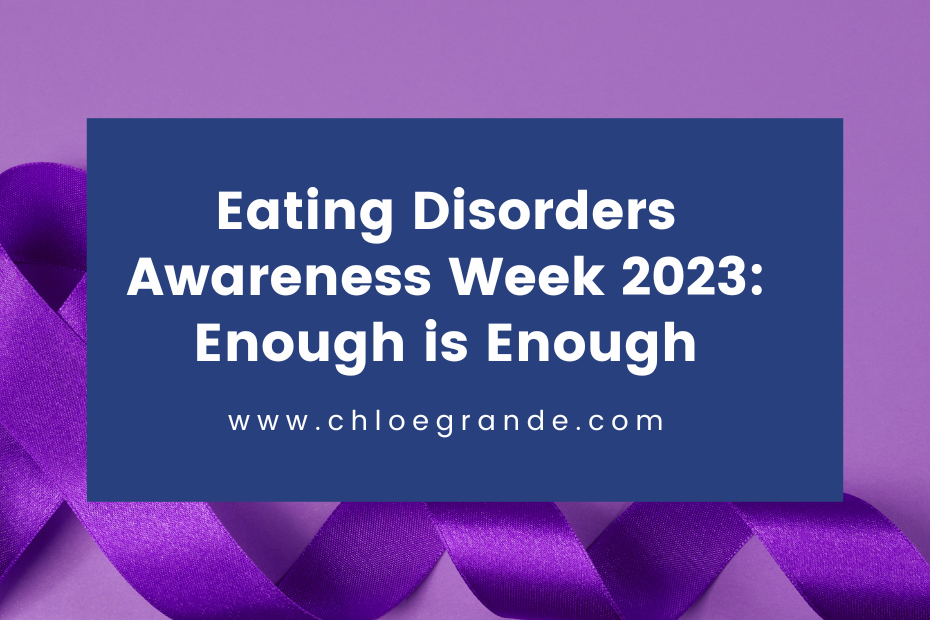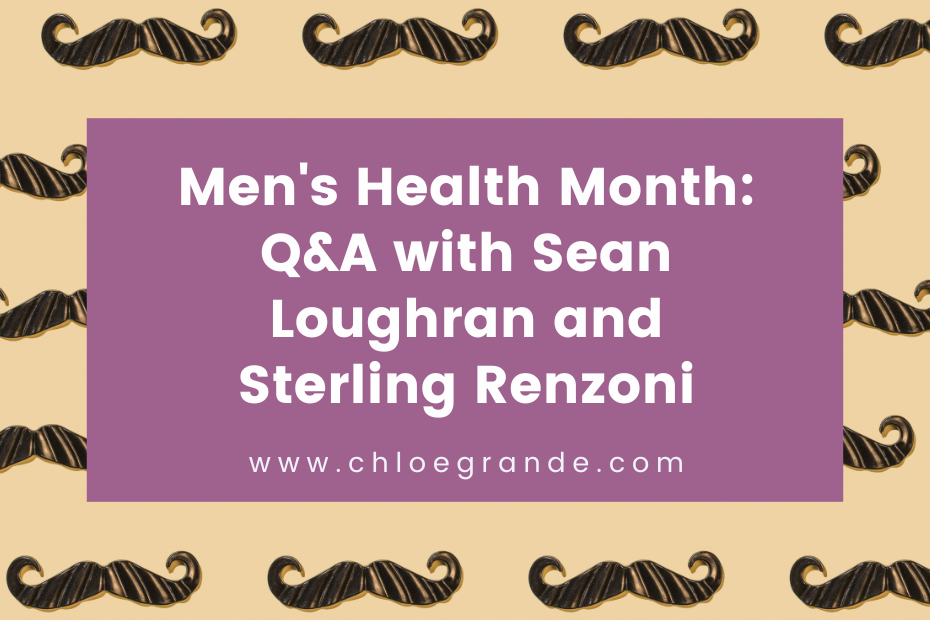A new addition to my blog, the Friends & Family FAQ is where I answer questions about supporting someone with an ED. Scroll down to my social media handles to send a question!
This advice is based off my personal experience. As a reminder, I am not a medical professional — please contact Canada’s National Eating Disorder Information Centre to seek professional help.
The first question I’ve received for my Friends & Family FAQ is two-pronged: How can I tell if my friend has an eating disorder and how can I be supportive without triggering them? Both are excellent questions that show such a deep level of empathy and care — kudos to the person who submitted them!
I’ll be the first to admit it’s hard to tell if a friend has an eating disorder. We can be so, so good at covering it up and acting “normal” in person or online, especially around those closest to us.
However, there are some red flags to look for:
- Changes in behaviour: Weight is not a reliable indicator of an eating disorder. Look beyond the surface to examine changes in your friend’s mood. Are they crankier than normal? More tired than usual? Having mood swings for no reason? That’s a good sign something is up.
-
-
Example: I remember being so tired I could barely make it to 9 pm before falling asleep. I also lacked the energy to engage in as many social activities as I normally would.
-
-
- Increased focus on food: Your friend may be very particular about the amount of food they are eating. For example, inspecting the nutrition labels and decreasing their portion sizes. They could use excuses like: “I’m just trying to eat healthier” or “I wanted to see what all the hype is around keto.”
-
- Example: With EDs, your whole day revolves around food. What to eat, when to eat, where to eat. It’s exhausting. The type of digital content I consumed only made things worse — if it’s possible to see what type of social media accounts your friend is engaging with (i.e. pro-ana or dieting ones), that could be an indicator.
-
- Avoiding activities they usually enjoy: It could seem like your friend has no interest in catching up over (physically-distanced) coffee or patio drinks. This avoidance could be entirely due to the fact that food is involved. Even seemingly non-food related events are hard — like going to a movie — because our EDs make everything about food (after all, who can resist popcorn at the movies?!).
-
- Example: At my sickest, I avoided going to the mall, no longer interested in the Pretzelmaker’s deliciously gooey treats and dreading seeing my body in the fitting room mirrors. In my early 20s, I would only accept dinner invites if it meant I could eat beforehand (as a way to control my intake) and intensely research the menu in advance. Spontaneous, last-minute plans didn’t exist.
-
Okay, so you’ve noticed your friend never wants to get post-soccer game ice cream anymore, seems to be less upbeat/more moody, and has downloaded a bunch of weird food-tracking apps. Should you be worried?
Here’s how I would approach it.
- Start conversational. Before bringing up anything to do with food or eating disorders, I suggest first asking how they’re really doing. Is everything alright with school/work/family? Sometimes there can be an underlying reason why they’re acting differently — such as the recent death or illness of a loved one.
- Dig deeper. If they deny that anything is wrong, take a big breath, and try something like, “The reason I was asking is because I’m a bit worried about you. I’ve noticed that you seem more ___ than usual and more focused on ___. I care about you and want to help if something is wrong.” List facts or behaviours you have seen, to seem less accusatory. (Warning: They will likely take this all very personally.)
- Expect denial. Before my diagnosis, I would never consider myself to be someone suffering from an eating disorder. The stigma was too risky. It’s better to be seen as someone who appears “in control” or “health-conscious.” Deep down, they are really touched that you care.
- Suggest resources. If you’ve had your own mental health struggles, be open. What helped you? It can make them more likely to talk if you’ve also being vulnerable. Mention that you’ve been learning about eating disorders (this blog!) and even send them a link to NEDIC’s help page, a resource I highly recommend. I’d also recommend my first blog post, as they may resonate with my experience and it could be a springboard to further exploring eating disorder recovery.
At the end of the day, you have stepped in, made an offer to help and stood by your friend. The next steps are in their hands, if you’ve opened the gateway for open, honest communication. Know that you’ve already made a difference by simply expressing concern and caring for their well-being. ❤️




Very helpful advice. Thanks for the practical tips.
Thank you for the feedback, Mari! It is always appreciated 🙂
Another thing that might be a clue is that they’re wearing looser/less fitted style clothes ?
Absolutely! Harder to tell if not in person, but definitely a sign if you are seeing them face-to-face. I’d add as well that wearing off-season clothes in warmer weather, like a sweatshirt in mid-July, is also a sign someone is covering their body.